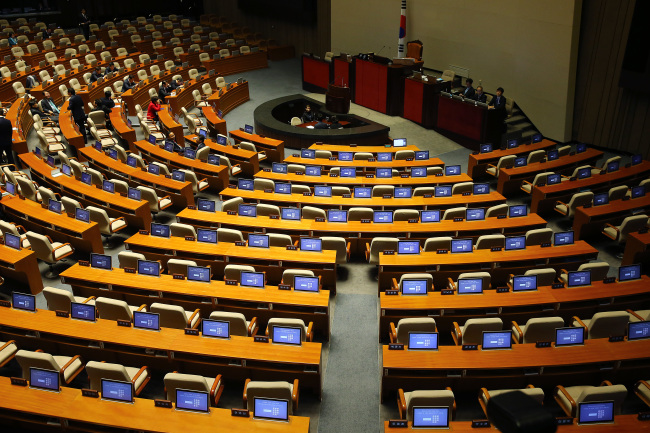The rival parties’ conflict over the passage of pending bills peaked on Friday, with the ruling Saenuri Party refusing to make amendments to its North Korean human rights bill and The Minjoo Party of Korea demanding an immediate redrawing of the nation’s electoral map.
The parliamentary session that was originally slated for 2 p.m. was delayed all throughout the afternoon before it finally fell through.
The last-minute variable came from the main opposition Minjoo camp, which suddenly reneged on an earlier agreement to vote on the corporate revitalization bill first and put off the remaining pending bills to further discussion.
Minjoo Party floor leader Rep. Lee Jong-kul, in a meeting with his Saenuri counterpart Won Yoo-chul, demanded that the ruling party consent to a series of unsettled bills, such as the revision bill on the minimum wage and the carbon industry support bill. He also demanded that the election law revision bill to redraw the nation’s constituency map be put to a floor vote, along with other bills.
“We have decided to wrap up the electoral map issue and process the pending bills in a rational order, even at the risk of delaying the general meeting,” Lee said.
The Saenuri floor leader refused the proposal but added that the Saenuri Party would accept the minimum wage bill and the carbon industry bill, if the Minjoo Party accepts the deadlocked North Korean human rights bill.
“Both parties clearly agreed to vote on the corporate revitalization bill and the North Korean human rights bill and then move on to a leadership meeting to discuss the electoral map,” Won told reporters.
“But for some reason, (the Minjoo Party) is violating our earlier agreement.”
 |
| The ruling Saenuri Party lawmakers sit in the general meeting room on Friday, waiting for opposition parties to show up. The parliamentary session fell through, amid partisan feuds over the passage of the revised electoral map. Yonhap |
The two parties were poised to attend the parliamentary general meeting at 2 p.m. to vote on the corporate revitalization bill to offer restructuring support to insolvent companies. They had also attempted to do the same for the human rights bill but failed to reach an agreement on a controversial clause which defines the purpose of the bill.
Amid the bipartisan conflict, independent Rep. Ahn Cheol-soo and his forthcoming People’s Party condemned both main parties, accusing them of playing power games and neglecting the people’s needs. But the centrist party also urged that parties pass the human rights bill, adding weight to the ruling camp’s stance.
Signs of feuds showed up earlier in the afternoon when Reps. Kim Jung-hoon and Rhee Mok-hee, the policy committee chiefs of the Saenuri and Minjoo Party respectively, failed to reach a last-minute consensus on the North Korean human rights bill.
It was the main opposition Minjoo camp’s demand to amend the second clause of the bill to place more focus on improving inter-Korean relations. The ruling conservative Saenuri camp, however, claimed that the bill should concentrate on human rights promotion and that peace clauses should be included in the inter-Korean exchange and cooperation law.
“This clause is indeed the core of the North Korean human rights bill as it shows the underlying legislative view,” Rhee said, after the meeting turned sour.
The corresponding bill, motioned by a Saenuri lawmaker in 2012, calls for efforts to raise the international society’s awareness of human rights abuses in the communist state and to ensure that humanitarian aid is not diverted to other uses. It is also considered a diplomatic tool to exert pressure on the North Korean regime not to misuse outside aid to support its military.
While the ruling party pushed ahead with it, the opposition party has resisted, claiming that it may provoke the communist neighbor.
By Bae Hyun-jung (tellme@heraldcorp.com)

